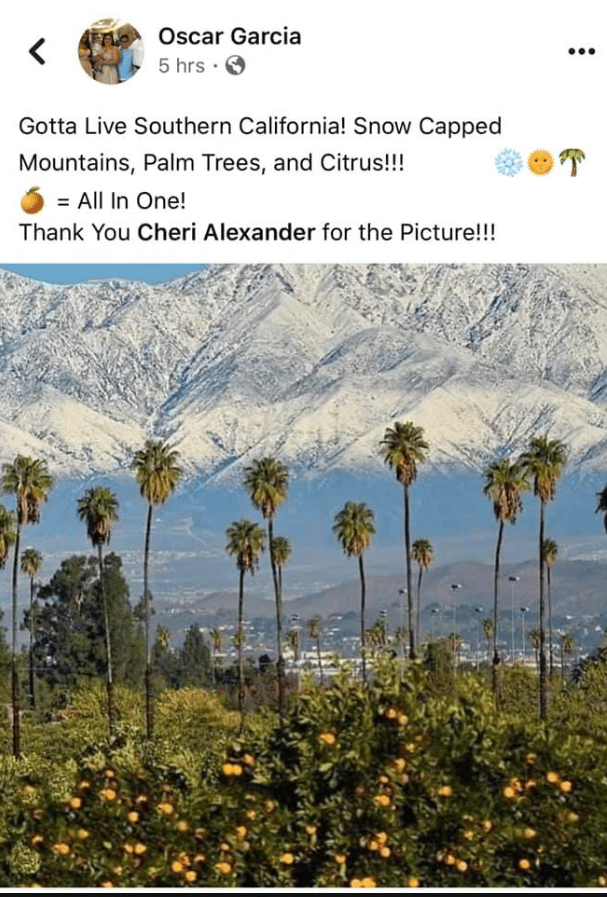

What’s wrong with these photos?
Take a look at the posts above. At first glance, it appears to be the exact same picture. If you look at it longer, you will see it is the exact same picture. However, the post on the far right is identified as being taken in California, and the post on the left is identified as being taken in Tucson, Arizona. The difference between these two posts is quite simple to spot, but it can be very difficult to validate its authenticity without the proper resources.
So which post, if either, is accurate and how can it be verified? This is why authenticity is key. Authenticating social media evidence will enhance and confirm the findings of your social media investigation. Our practical resources and team of highly-trained investigators are here to make the authentication process straightforward and simple.
How Will Authenticating Social Media Evidence Help your Investigation?
In a day and age wherein the Internet and social media platforms such as Facebook, Instagram, Snapchat, and many others, hold information about virtually everyone, the saying holds true: “if you post something to social media, it’s there for everyone to see.”
Yes, essentially everything posted on social media is available to anyone; however, is everything posted on social media assumed to be authentic? A Pennsylvania Superior Court case, Commonwealth v. Mangel, addressed the standards by which social media must be authenticated to be admitted as evidence in court. In this case, social media posts were introduced alleged to have been made by the defendant, merely because these posts came from a Facebook account that had the same name, location, and high school attended as the defendant.
The court ultimately did not allow the admission of this social media evidence, due to the failure to properly authenticate it. Insufficient evidence was presented to conclude that the defendant did in fact, create and maintain this Facebook account, and was the creator of the social media posts in question.
How Do We Authenticate Social Media Evidence?
As seen in the photo above, social media posts can be re-posted, falsified, or just simply labeled incorrectly. The above photo was confirmed to be taken in Southern California. So, how did we verify this photo was in fact, taken in Southern California, and not Tucson, Arizona?
Any social media account can easily be falsified, or a legitimate account can be accessed by an impostor; therefore, creating challenges when authenticating social media accounts and posts. With that being said, first, we must authenticate the social media account that the subject post came from, ensuring that this account has strong ties to the individual said to be running the account. The most valuable methods of ensuring authentication include: linking it to a phone number, email address, and/or user handle belonging to this individual.
After one or more of these links have been established, we then look for 3-5 additional points of information that the courts have termed “specific indicia”, which further establishes that this individual is in control of this account. Such points include specifics pertaining to the individual, such as: high school reunions, family gatherings, events attended, etc.
You can even look at their pattern of posting. Do they post frequently, or not so often? What kind of content do they post? Does the content in question match up with the other they regularly post? For example, if an individual posts frequently about their fitness journey, and then begins to post large amounts of content pertaining to fast food/unhealthy habits, this may raise a red flag as to whether this individual is still in control of this account.
Finally, after the social media post has been authenticated, we forensically preserve the metadata. Numerous cases have come out across the United States where “print screens” or other printouts from a social media profile have been excluded as social media evidence. Forensic preservation includes capturing the social media post and also extracting the metadata associated with that specific post. This metadata will contain the date/time of the post, account the post was taken from, helping ensure the social media evidence is admissible in court.
Social Media Authentication Services You Can Count On
At Bosco Legal Services, Inc., we provide services to law firms, insurance companies, and businesses. Over the last 10 years Bosco Legal Services, Inc., has become a recognized leader in Social Media Investigations and has been conducting other types of investigations for over 30 years.
Each investigator is specially trained in proper social media evidence gathering, authentication, and preservation techniques to help defend against inflated injury claims and fraud and provide our clients with the most exceptional results.
If you need help gathering, preserving, and authenticating social media evidence, we are here to help.




